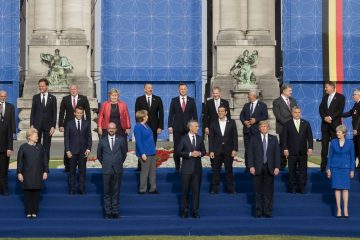
Chaos by Design: The Dehumanising Nature of US Aid Airdropped into Gaza
Since October 7, Israel has blocked most food, water, hygiene items, and medicine from entering Gaza. The government has denied access to aid agencies, security inspections have deliberately slowed the entry of trucks, communication blackouts have cut off internet and phone services to more than two million residents, and Israeli protesters have lined up to block humanitarian aid supplies. Moreover, the US, UK, and other donors suspended funding to UNRWA, the UN’s aid agency for Palestine, after Israel accused staff members of participating in the October 7 attacks and called for the organisation to be disbanded. Crucially, these accusations have not been proven. As a result, people in Gaza are starving. Sixteen children, and counting, have died of malnutrition, UN …

OxPol Blogcast. Women in Politics – In Conversation with Rachel Bernhard: Can Gender-Typical Appearance and Behaviour Help Candidates Win Office?
OxPol Blogcast showcases research, analysis, insights, and experiences from the members of the University of Oxford’s Department of Politics and International Relations (DPIR), and specialist guests from the Oxford academic community and beyond. Are masculine behaviour and appearance among the prerequisites for electoral success, in line with popular belief? On this episode, OxPol Blogcast host Anastasia Bektimirova is joined by Dr. Rachel Bernhard, an Associate Professor at the University of Oxford’s Department of Politics and International Relations (DPIR), to put the view of the political arena as a place favouring conventionally masculine traits to a test. Focusing on the United States, Rachel explains what is understood as masculinity and femininity in political leadership, and guides us through the observed variation in voters’ response to those cues. We also discuss …
A Very Spanish Coup: What Can America Learn from the 1981 Spanish Coup
The storming of the American Capitol building on the 6th of January 2021 during a session to formalize Joe Biden’s presidential victory made headlines around the world. For many Americans, the fact that there was an armed attempt to disrupt a democratic transition of power was a worrying sign of democratic backsliding and the consequence of years of extreme partisanship. The siege suggested a grim vision of America’s political future. However, 40 years ago, the Spanish political system was able to recover from a similar event, in what could be an instructive experience for contemporary America. In February 1981, the Spanish political system, which had rapidly democratised following the death of General Francisco Franco in 1975, faced its first real …
Looking Beyond the White House: A Blueprint for the UK’s International Cooperation
The chasm between what the presidencies of Trump and Biden mean for the ‘special relationship’ between the US and the UK has starkly demonstrated how dependent the UK is on the occupant of the White House for its relationship with the US. It would be easy for the UK to forget the lessons it learned from engaging with Trump, who put less value on the bilateral relationship with the UK, because of the comparative enthusiasm of President Biden. However, it is exactly the experience of the Trump era that should convince UK policymakers to think about how to insulate the UK from volatility in the White House. US-UK cooperation on areas like security and defence will never be in question, but the likelihood of a broad trade deal, …
Covid-19: Will US World Power Continue On?
It has become a recurrent point for commentators to propose that we are living in the remnants of an old and dying world order with a new one waiting to take over. Namely, they predict that the US and the West is on the verge of losing its global hegemony to Asia. Even before Covid-19, many predicted that a Chinese-led world order was imminent, as evidenced by a photo in 2018 of US-China trade discussions. Philosopher Antonio Gramsci described such a period as an interregnum where “a great variety of morbid symptoms appear.” The divergent world responses to Covid-19 have been viewed as evidence of these symptoms. Commentators have continuously compared the inertness of Western governments with the efficiency of China, South …

Who is Afraid of Supreme Court Justice Brett Kavanaugh?
President Donald Trump’s nomination of Brett Kavanaugh to the US Supreme Court has unsurprisingly been greeted by delight from the Right and despair from the Left. The chance to remake the image of the Supreme Court for decades to come with the nomination of a relatively young and reliably conservative justice is dreaded by some and celebrated by others. The significance of Kavanaugh’s – virtually guaranteed – confirmation to the Supreme Court is compounded by the fact that he would replace justice Anthony Kennedy. Kennedy has long been the decisive “swing vote,” who sometimes siding with the four conservative justices and sometimes with the four liberal justices. Being the deciding vote on many cases, Justice Kennedy played an outsized role in …

NATO, the Russian threat and defence spending
As expected, the recent NATO Summit was dominated by President Trump’s blunt criticisms of allies. He accused European member states of taking advantage of the United States, of failing to follow through on the 2014 agreement to raise defence spending to a minimum of 2% of GDP, and cozied up to Russia, perhaps most shockingly given the accusations levelled at his own campaign, of colluding with Russia. The basis for these accusations should be taken seriously, even if the latent threat of the United States withdrawing from NATO and the capricious means of delivery seem designed more to appeal to American domestic political interests than to truly illicit reform of the organisation. Cutting through the hyperbole, we see that there …

The Rightward Shift of U.S. Foreign Policy Didn’t Start with Trump
The recent confirmation of Mike Pompeo as Secretary of State by the Senate symbolizes that nationalist “hawks” dominate the Republican Party’s foreign policy. Even the famously non-interventionist Republican Senator Rand Paul supported his nomination. Pompeo’s quick and frictionless confirmation points to a shift to the right in what constitutes “common-sense” in US foreign policy. However, as this article will argue such changes in US foreign policy have predated Pompeo’s nomination and even President Trump’s election. Mike Pompeo, who came to Congress with the Tea Party movement in 2010, is an interventionist of the America-First variety. He desires strong sanctions on North Korea, Iran and Russia, supports extra-legal military strikes in areas of jihadist activity, and deeply distrusts China’s economic and …









